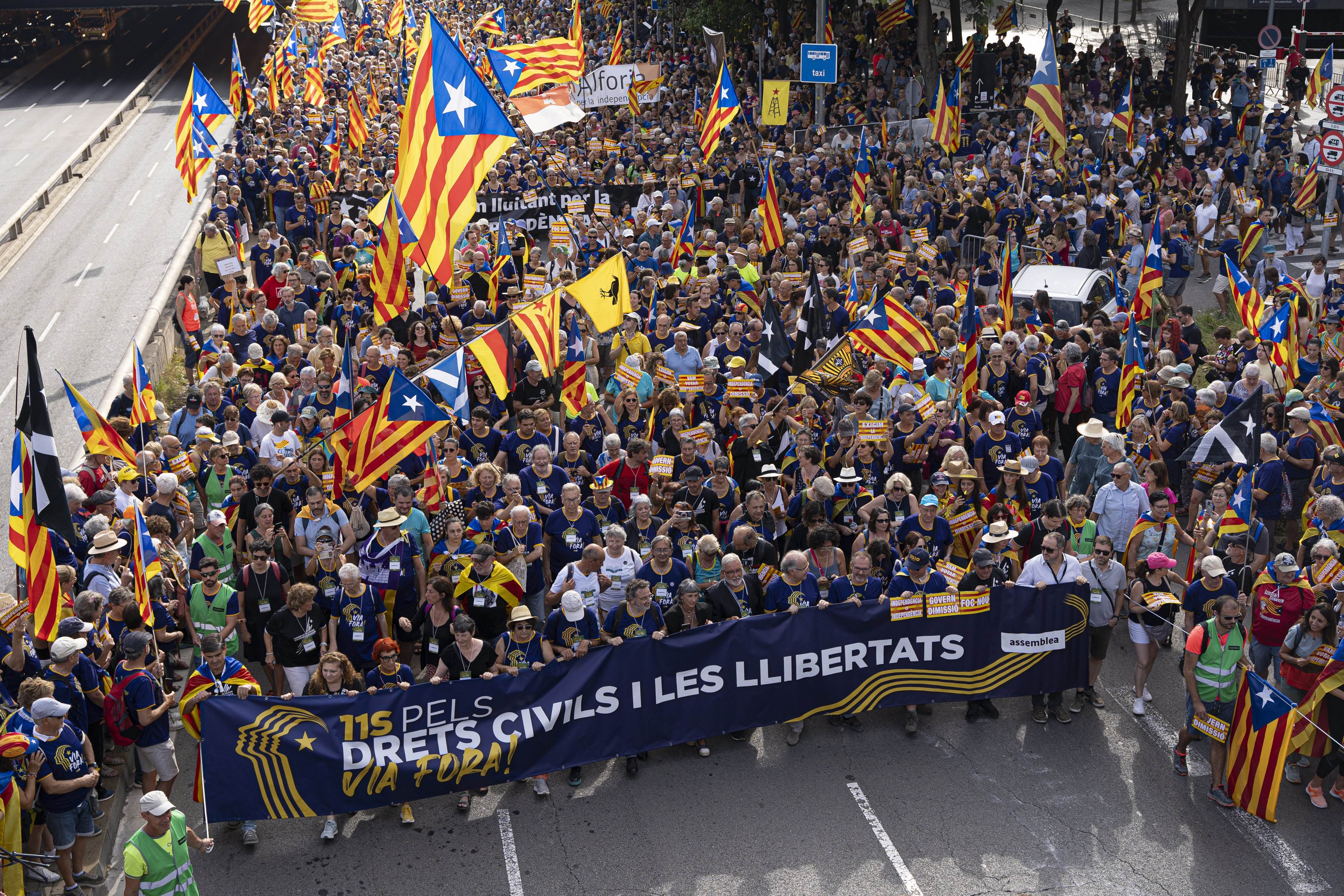The negotiations for the investiture of a new Spanish government have caused the demands from pro-independence Catalans to move into a stand-by position in this Monday's annual Diada march. The independence movement remains watchful to see whether the talks being held by the Catalan sovereignist parties in the Spanish Congress end up in a vote for the investiture of a new Spanish prime minister or to repeat the election. Without dropping the pressure, but attentive to the outcome of the negotiations that have given the president-in-exile, Carles Puigdemont, a surprising prominence. In this context, the civil society organizations and political parties have tried to avoid any image of internal division, despite the fact that at a Sunday event at Barcelona's Fossar de les Moreres, the jeering of the governing Catalan Republican Left (ERC) was repeated, while at the demonstration on Monday afternoon the cries of "Government, resign" were heard. It was again the president of the Catalan National Assembly (ANC), Dolors Feliu, with her commitment to a non-party civic list for elections, and her call of "Independence or elections", who broke away from the tone of most other speeches.
The address that Carles Puigdemont gave last Tuesday in Brussels, asserting that the amnesty is an essential pre-condition for dialogue on the investiture, and the attention that that captured in state powers, became the prologue of this year's Diada and marked the nature of the day. The president-in-exile spoke this Monday, through an audio recording, also at the Fossar de les Moreres in El Born. He claimed the need to defend the nation and made no reference to negotiations with the Spanish state. But in the street, shouts of support for Puigdemont were repeated throughout the day, as in previous marches.
The current president of the Generalitat of Catalonia, Pere Aragonès, was also present at the events of the day. He had to replace the ERC president, Oriol Junqueras, in the party events after Junqueras tested positive for Covid. The president also went to the traditional floral offering at the monument to Rafael Casanova - where last year the ERC delegation had to put up with whistles and protests from the public - and he took part in the afternoon demonstration called by the ANC, after not attending last year amid a confrontation between ERC and the organization. This time, however, the president was spared the whistles, with the only protests against the ERC delegation registered on Sunday night at Fossar de les Moreres.
The Diada rally
The demonstration this Monday afternoon was also a placid affair. Around 800,000 people responded to the call, according to the ANC - the figure was 115,000, according to Barcelona's Guardia Urbana police. After the tensions that dominated last year's Diada, last Friday saw an exercise in unity as Òmnium, the Council of the Republic, the Catalan National Assembly, the Association of Municipalities for Independence (AMI) and the Intersindical trade union signed the National Pact for the Civil Movement for Independence, which showed all the pro-independence civil society bodies lining up in the same direction.
This was one of the threads that ran through the speeches heard this afternoon following the demonstration. The president of Òmnium, Xavier Antich, defended this initiative, warning that "the only thing that can scare the state and can push the pro-independence parties forward is the cohesion of the independence movement", while on behalf of the Council of the Republic, the musician and activist Lluís Llach warned that disunity weakens independence. "We know the importance of the day to day and the "in the meantime", but it is not admissible that the political struggles make us lose the viability of our future as a country," he warned. As well, the president of the AMI, Jordi Gaseni, underlined the importance of this national pact signed on Friday and assured that "it is a good tool".
However, the president of the ANC, Dolors Feliu, despite celebrating the unity of all the pro-independence associative bodies, went straight into a criticism of the political parties and defended the civic electoral list promoted by the Assembly. Feliu claimed that any agreement with the state must be "independence or nothing" and that the Catalan Parliament must commit to the result of the 1st October referendum - or else the Catalan government must call elections. "Anything else lowers the democratic minimums and whitewashes the Spanish state in the eyes of Europe", warned Feliu, who demanded that if the parties don't dare to do this, they must give way to other politicians by calling elections. The public responded to Feliu's appeal by chanting the slogan "Government, resign". It was the only moment of the event at which this chant prevailed.

